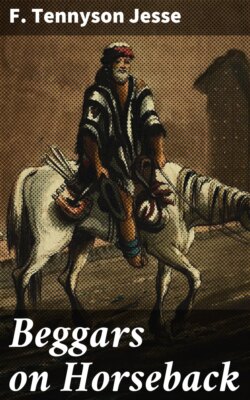Читать книгу Beggars on Horseback - F. Tennyson Jesse - Страница 6
На сайте Литреса книга снята с продажи.
II
FIRST STEPS
ОглавлениеTable of Contents
To the making of such a scene as that recounted in the contemporary journal, much had gone during the months so crudely analysed. That damning pile of evidence had been building itself up, touch upon touch, since the first moment when Sophie Bendigo's eyes lit on the instigator of the trouble; and the causes of her own share in it had been strengthening from far earlier even than that. In after years the Wise Woman of Bosullow would recount that when the baby Sophie was brought to her to be passed for luck through the ringed stone of the Men-an-Tol, she had foretold for her the rise in life that eventually came about. True, the terms of the prophecy had been so vague that beyond the fact that a ladder, metaphorical or otherwise, was to play a part in Sophie's career, Mr. Bendigo had not been much the wiser. The mother had lain in the bleak moorland churchyard for several years now, but she had had time, during the most malleable years of a girl's life, the early teens, to impress Sophie with a sense of destiny. Not for her the vulgar loves and joys of other country girls, to her some one shining, resplendent, would come flashing down, and Sophie must learn to bear with powdered hair and hoops against that moment. For London, of course, would be her splendid bourne, and as to saying that hoops got in the way of her legs—why, hoops were the mode and to a hoop she must come. Since Mrs. Bendigo had died, worn out by the terrible combination of the Squire's slow cruelty and his suave tongue, Sophie had given up the struggle with hoops and powder, but she still lived for and by her vision of the future. If Sophie Bendigo had not glanced over her shoulder in Troon Lane, thereby presenting an exceptional face at the most alluring of angles—chin up and eyes innocently sidelong—to the view of Mr. Crandon, she might never have climbed so high. When she saw Mr. Crandon, his white wig tied with a black ribbon, and an excellent paste pin flashing from his cravat, riding up the lane, she never doubted that her star had risen at last.
Sophie Bendigo was of the pure Celtic type still preserved among the intermarrying villages of West Penwith. Her rather coarse hair was a burnt black, so were her thick, straight brows, but her eyes were of that startlingly vivid blue one only meets in Cornish women and Cornish seas. There was something curiously Puck-like about Sophie; the cheekbones wide and jaw pointed, while her mouth was long, the thin, finely cut lips curving up at the ends, and there was a freakish flaunt at the corners of her brows—Crandon thought of piskies as he looked. She wore a plain white gown, low in the throat and short in the sleeve, and she carried an apron-load of elder-flower, the pearly blossoms of it showing faintly green against the deader white of the linen.
"Excuse me, but does this lead to St. Annan?" asked Crandon, bending a little towards her. Sophie felt one swift pang lest he should be riding out of her life straightway, and swiftly answered:
"You are out of your way," she told him, "this lane only leads to our house. You must go back to the highway and follow it past the 'Nineteen Merry Maidens' and turn on to your right—but it is a matter of three or four miles."
For a moment they remained looking at each other, then Crandon said:
"Is there perhaps an inn near here where I and my mare could rest? We have come from Zennor this morning, and she is newly shod."
"There is no need for an inn," said Sophie, "we are always glad to rest a traveller at Troon Manor. I am Sophie Bendigo."
Crandon smilingly dismounted and walked by her side up the lane.
"It would be ungracious to refuse when the Fates have led me and Venus herself seconds the invitation. . . . Have you just risen from the sea, I wonder, that your eyes still hold its hue?"
Sophie, used only to the clumsy overtures of the county squires, flushed with pleasure, not at the allusion, which she did not understand, but at the air of gallantry which pervaded the man. She glanced up admiringly between her narrowed lids—Crandon was accustomed to such glances, so had his girl-wife in Scotland looked at him, before he deserted her and her child. He meditated no harm to this girl, no plan was formulated in his mind; and as to the ten thousand pounds, of which so much was heard later on, no whisper of it had then reached his ears. The road had led to her, her own face lured him on, and a few hours of a pretty girl on such a June day, where was the harm? The innocence and spontaneity of his feelings gave the Captain a delightful glow of conscious virtue, and he walked beside Sophie with a slight swagger of enjoyment.
